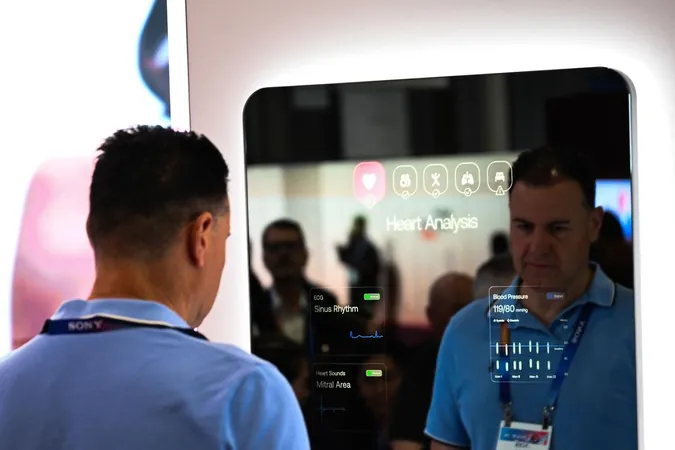
The Future of Health Monitoring: How Wearable Tech is Going Beyond Basic Tracking
2025-01-09
Author: Mei
In a groundbreaking showcase at the Consumer Electronics Show (CES) in Las Vegas this week, the world of wearable technology has taken a monumental leap forward. No longer just devices for tracking steps or heartbeats, modern wearables now have the capability to monitor critical health indicators including blood oxygen levels, glucose concentrations, and blood pressure—all raising exciting new possibilities for personal healthcare.
The global market for wearable health trackers, which includes smartwatches and fitness bands, has ballooned to approximately $60 billion and is projected to surpass $100 billion by the end of this decade. Nearly a decade after the revolution brought about by the launch of the Apple Watch, awareness of the importance of heart health has surged. "Before smartwatches, no one was thinking about heart rate monitoring," said Anna Barnacka, CEO of health tech startup MindMics. Her company is pushing the boundaries by using innovative headphone technology combined with wave-based analysis to deliver detailed insights into cardiac activity that rivals medical-grade diagnostics.
Barnacka recounted a compelling example from clinical trials where their device identified a heart murmur in a patient suffering from aortic stenosis—a condition requiring invasive tests for confirmation. The prospect of conducting such analyses non-invasively could significantly change the current diagnostic landscape.
Another noteworthy innovation introduced at CES is Stelo, a revolutionary patch from California-based DexCom. Unlike traditional blood sugar monitors designed exclusively for diabetics, Stelo is available to anyone interested in understanding their metabolic responses to food. With nearly 100 million Americans classified as prediabetic—often unaware of their status—Stelo is positioned to empower consumers with essential health information. "The vast majority of them don’t know they have prediabetes because they haven’t had the testing," noted DexCom's COO Jake Leach.
Despite the excitement surrounding these advancements, the reliability and regulation of wearable health data remain contentious. Some experts, like Diana Zuckerman, president of the National Centre for Health Research, express concern about the FDA's approval process, stating that connected devices undergo far less rigorous testing than pharmaceuticals. “The only way to assess the quality of the data being collected is if it’s made publicly available for evaluation,” she argued.
Furthermore, while many companies are undertaking independent studies validating their products, skepticism persists in the medical community. Tammy Brady, a professor at Johns Hopkins University focusing on pediatric hypertension, voiced caution about using wearable blood pressure monitors for clinical decisions. "For now, they’re too approximate to use reliably," she stated. However, there is optimism that the establishment of ISO standards for cuffless blood pressure devices could lead to better testing protocols.
As advancements continue to emerge from the intersection of healthcare and technology, the true impact of these devices on personal health management will ultimately depend on their validation and adoption by both consumers and healthcare professionals. Exciting times lie ahead in the world of wearable tech—and the potential to transform health tracking into a more precise and insightful journey is just beginning. Stay tuned as we uncover the profound changes this technology holds for the future of healthcare!

 Brasil (PT)
Brasil (PT)
 Canada (EN)
Canada (EN)
 Chile (ES)
Chile (ES)
 Česko (CS)
Česko (CS)
 대한민국 (KO)
대한민국 (KO)
 España (ES)
España (ES)
 France (FR)
France (FR)
 Hong Kong (EN)
Hong Kong (EN)
 Italia (IT)
Italia (IT)
 日本 (JA)
日本 (JA)
 Magyarország (HU)
Magyarország (HU)
 Norge (NO)
Norge (NO)
 Polska (PL)
Polska (PL)
 Schweiz (DE)
Schweiz (DE)
 Singapore (EN)
Singapore (EN)
 Sverige (SV)
Sverige (SV)
 Suomi (FI)
Suomi (FI)
 Türkiye (TR)
Türkiye (TR)
 الإمارات العربية المتحدة (AR)
الإمارات العربية المتحدة (AR)